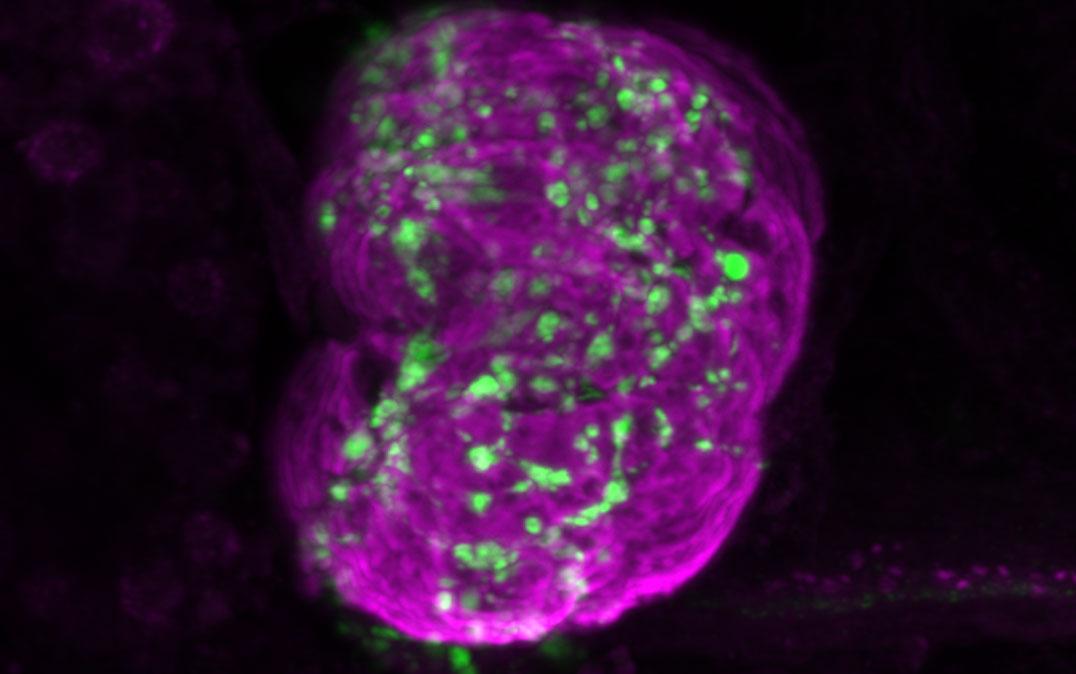Research News
Researchers Clarify Neuronal Function Preventing Insects from Producing Eggs in Winter

The University of Tsukuba researchers have uncovered neuropeptides (a type of neurotransmitter) that control "reproductive dormancy" in certain insects. This phenomenon suppresses egg production during the winter and other unsuitable seasons for reproduction. Although a neuronal mechanism to regulate this process has been known for >50 years, the specific mechanism has now been identified for the first time.
Tsukuba, Japan—Dormancy is a survival strategy for many organisms that involves suppressing development and reproduction for a period of time to reduce energy consumption in unfavorable environments. In some insects, reproductive dormancy occurs during seasons unsuitable for reproduction due to a decrease in the amount of juvenile hormone, which is a well-known insect hormone. Although neurons projecting from the brain to the juvenile hormone-producing organ (corpus allatum) have been known to regulate reproductive dormancy for >50 years, the specific neurosecretory factors controlling the amount of juvenile hormone remain unclear.
Herein, researchers used the fruit fly Drosophila melanogaster to demonstrate for the first time that the neuropeptide diuretic hormone 31 (DH31) regulates reproductive dormancy. The researchers discovered that neurons projecting from the brain to the corpus allatum produce DH31 and that DH31 secreted by these neurons is crucial for reproductive dormancy. Additionally, they found that DH31 receptors are expressed in the corpus allatum and that receiving DH31 suppresses juvenile hormone production, inducing reproductive dormancy.
Given the evidence that neurons projecting to the corpus allatum regulate reproductive dormancy in various insects and that DH31 is conserved, it is likely that DH31 controls reproductive dormancy in a broad range of insect species. Understanding the mechanisms of insect dormancy control could lead to the development of new technologies to control agricultural pests and infectious disease vectors.
###
This work was supported by KAKENHI of the Japan Society for the Promotion of Science (21J20365 to Y.K., 17J00218 to E.I., 26250001 and 17H01378 to H.T.) a Grant-in-Aid for Scientific Research on Innovative Areas (21H00226) from JSPS to R.N, and JST SPRING JPMJSP2124. This research was also funded by project 22-21244S from the Czech Science Foundation, Czech Republic, to M.N., and grants R21AI167849 to F.G.N. and R21AI153689 to M.N. from the National Institutes of Health-NIAID, USA.
Original Paper
- Title of original paper:
- Female reproductive dormancy in Drosophila is regulated by DH31-producing neurons projecting into the corpus allatum
- Journal:
- Development
- DOI:
- 10.1242/dev.201186
Correspondence
Professor NIWA Ryusuke
Life Science Center for Survival Dynamics, Tsukuba Advanced Research Alliance (TARA), University of Tsukuba
Related Link
Life Science Center for Survival Dynamics, Tsukuba Advanced Research Alliance (TARA)




